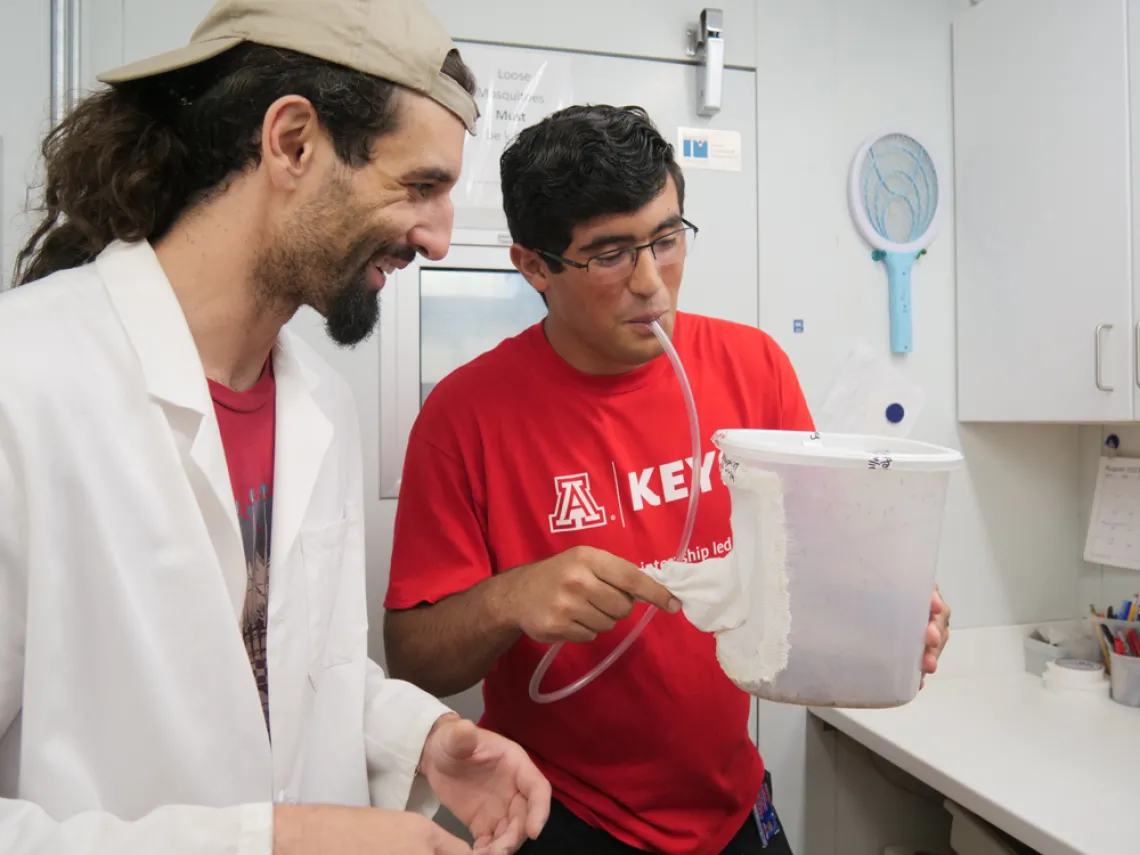KEYS Research Internship program achieves record number of applicants
This year, the BIO5 Institute's KEYS Research Internship received an unprecedented 430 applications, showcasing a tremendous interest from Arizona's high school students aged 16 and older in the field of bioscience.

2023 KEYS intern Adrian Matzkin is assisted by doctoral student Brendan Riske in an entomology lab. Both in the lab of Michael Riehle, professor in the University of Arizona Department of Entomology and BIO5 member, they are using spectroscopic and microscopic techniques to under insect physiology that could help prevent disease outbreaks, such as malaria, Zika and dengue fever.
Deanna Sanchez, BIO5 Institute
The University of Arizona BIO5 Institute’s KEYS Research Internship program is thrilled to announce a groundbreaking surge in applications for its upcoming summer 2024 cohort.
The Keep Youth Engaging in Science (KEYS) Research Internship program, dedicated to inspiring and empowering the next generation of scientists, provides participants with a transformative 7-week summer experience. Interns engage in real-world bioscience research mentored by UArizona faculty, gaining valuable knowledge and skills in STEM research, biotechnology, data science, and science communication. The program operates with a commitment to diversity and accessibility, aiming to be a free and accessible experience for all participants.
Application Snapshot
- Total applications: 430
- Pima County applications: 184
- Out-of-Town Applications (Coconino, Cochise, Maricopa, Navajo, Santa Cruz, Yuma counties): 246
- Applications specifically from Maricopa County: 237
- High Schools Represented: 83
- Arizona Cities/Towns Represented: 26
"This overwhelming response emphasizes the enthusiasm and commitment of Arizona's young minds toward bioscience research," said Kelle Hyland, KEYS program manager. "We anticipate the growing interest and application pool for the KEYS program to continue. This year’s increase in applications also highlights the need for continued support to ensure that KEYS remains a free and transformative experience for all participants."
The program, which will begin in June with a cohort of 56 students, is funded through several sources, including donations from community and industry supporters. The KEYS to the Future Endowment Fund plays a crucial role in sustaining the program's commitment to offering the internship at no cost to the student, providing a pathway for future generations to become scientific innovators and ambassadors for science.
With 687 alumni of the program, 60 percent of these alumni chose to stay in Arizona, with a majority attending UArizona, and 96 percent have attended or are currently attending college, with most pursuing STEM degrees.
How to Contribute:
Those interested in supporting the KEYS Research Internship program and contributing to its endowment can do so through the University of Arizona Foundation. Every contribution, big or small, makes a significant impact on the program's ability to continue its mission of inspiring and empowering the scientific leaders of tomorrow.
About BIO5 Institute:
The BIO5 Institute at the University of Arizona brings together hundreds of scientists from across five disciplines - agriculture, engineering, medicine, pharmacy, and basic science - to find creative solutions to humanity’s most pressing health and environmental challenges. This interdisciplinary approach is an international model of how to conduct collaborative research, and has resulted in disease prevention strategies, promising new therapies, innovative diagnostics and devices, and improved food sustainability. Learn more at bio5.org.
About KEYS Research Internship:
The KEYS Research Internship at the BIO5 Institute is dedicated to inspiring and empowering Arizona's high school students aged 16 and older in the field of bioscience. Our mission is to provide a transformative summer experience, engaging interns in real-world bioscience research mentored by University of Arizona faculty. KEYS interns gain valuable knowledge and skills in STEM research, biotechnology, data science, and science communication through active participation in cutting-edge research within a higher-education environment to increase self-confidence and science identity. With a commitment to diversity and accessibility, KEYS strives to be a free and accessible program for all participants, laying a solid foundation for their future success in STEM-related fields.

